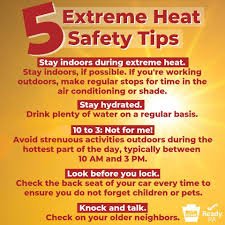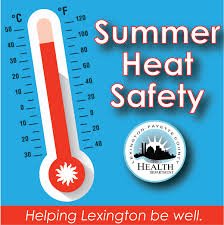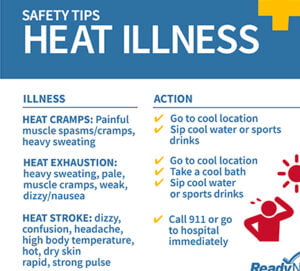Health Problems in Extreme heat
- Extreme heat in summer can lead to several health problems, ranging from mild to severe.
- Here are some common health issues associated with extreme heat:
- Heat Exhaustion:
- Symptoms: Heavy sweating, weakness, cold or clammy skin, fast or weak pulse, nausea or vomiting, muscle cramps, dizziness, and headache.
- Prevention/Treatment: Move to a cooler place, drink water, take a cool shower, and rest.

Heat-Illness Problem in Heatwave
- Heat Stroke:
- Symptoms: High body temperature (103°F or higher), hot, red, dry, or damp skin, rapid and strong pulse, headache, dizziness, nausea, confusion, and loss of consciousness.
- Prevention/Treatment: Call 911 immediately. Move the person to a cooler place, use cool clothes or a cool bath, and do not give the person anything to drink.
- Heat Cramps:
- Symptoms: Muscle spasms or cramps, usually in the legs, arms, or abdomen, often occurring after exercise.
- Prevention/Treatment: Stop all activity and sit in a cool place, drink water or a sports drink, and avoid physical activity for a few hours after cramps subside.
- Heat Rash:
- Symptoms: Red clusters of small blisters that look like pimples on the skin, usually in areas of the body that stay wet from sweat, such as the neck, chest, groin, or elbow creases.
- Prevention/Treatment: Keep the affected area dry, and use powder to soothe the rash.

Safety Tips in extreme summer
- Dehydration:
- Symptoms: Thirst, dry mouth, dark-colored urine, dizziness, confusion, and fatigue.
- Prevention/Treatment: Drink plenty of fluids, eat water-rich foods, and avoid excessive alcohol and caffeine consumption.
- Sunburn:
- Symptoms: Red, painful, and warm skin that may peel after a few days.
- Prevention/Treatment: Use sunscreen with an appropriate SPF, wear protective clothing, and avoid direct sun exposure during peak hours.
- Heat Syncope:
- Symptoms: Fainting or dizziness, typically occurring when standing for a long time or suddenly rising from a sitting or lying position.
- Prevention/Treatment: Sit or lie down in a cool place, slowly rise after sitting or lying down, and stay hydrated.
- Heat Edema:
- Symptoms: Swelling in the legs and hands due to the body’s inability to maintain proper fluid balance.
- Prevention/Treatment: Elevate the affected limbs, avoid tight clothing, and stay cool and hydrated.
- Kidney Stones:
- Symptoms: Severe pain in the side and back, below the ribs, pain during urination, pink, red or brown urine, nausea, and vomiting.
- Prevention/Treatment: Drink plenty of water to stay hydrated, which helps prevent the formation of kidney stones.
Taking appropriate measures to stay cool, hydrated, and informed about the symptoms of heat-related illnesses can significantly reduce the risk of these health problems.

Tips to stay safe in extreme heat,
consider these tips:
- Stay Hydrated: Drink plenty of water throughout the day, even if you don’t feel thirsty. Avoid beverages with caffeine or alcohol as they can dehydrate you.
- Stay Cool: Spend time in air-conditioned or shaded areas. If you don’t have air conditioning at home, visit public places like libraries or shopping malls that are cool.
- Dress Appropriately: Wear lightweight, loose-fitting, and light-colored clothing. Use hats and sunglasses to protect your head and eyes from the sun.
- Limit Outdoor Activities: Try to schedule outdoor activities during cooler parts of the day, such as early morning or late evening. If you must be outside, take frequent breaks in the shade and rest often.
- Protect Your Skin: Use sunscreen with a high SPF to protect your skin from sunburn. Reapply sunscreen every few hours, especially if you’re sweating or swimming.
- Know the Signs of Heat-related Illness: Learn the symptoms of heat exhaustion and heatstroke, such as heavy sweating, rapid pulse, dizziness, nausea, and confusion. Seek medical attention immediately if you or someone else shows these signs.
- Check on Vulnerable Individuals: Keep an eye on children, elderly people, and those with chronic health conditions as they are more susceptible to heat-related illnesses.
- Use Fans and Cooling Devices: If you don’t have air conditioning, use fans, cool towels, or take cool showers to lower your body temperature.
- Avoid Hot Cars: Never leave children or pets in parked vehicles, even for a short time. Temperatures inside a car can rise quickly and become deadly.
- Stay Informed: Pay attention to weather forecasts and heat advisories. Follow any guidelines or recommendations provided by local authorities.
Summary
- Taking these precautions can help you stay safe during periods of extreme heat.


